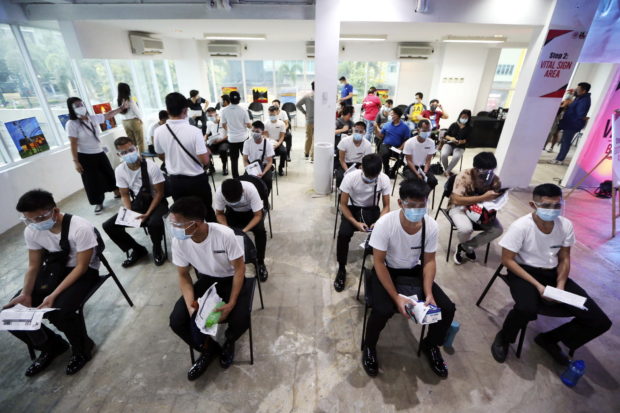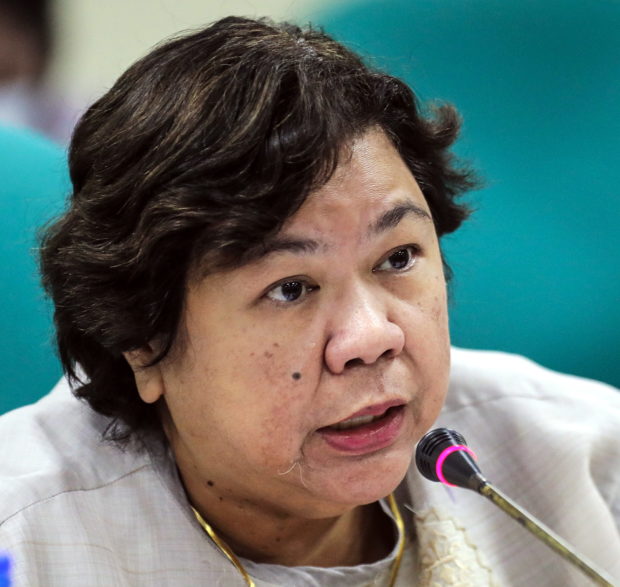Gov’t rushes to avert EU ban on PH seafarers

MARITIME SAFETY | President Ferdinand Marcos Jr. tasks five government agencies with crafting a plan to make the Philippines comply with EU rules and allow the continued deployment of maritime workers abroad, such as these outbound seafarers, in this file photo taken July 6, 2021, in Taguig City. (File photo by NIÑO JESUS ORBETA / Philippine Daily Inquirer)
MANILA, Philippines–President Marcos has ordered a collective effort involving several government agencies to ensure that the country’s training program and accreditation system for seafarers will finally pass the standards of the European Union (EU), according to Migrant Workers Secretary Susan Ople.
Around 50,000 Filipino seafarers working in European vessels are reportedly at risk of losing their jobs due to the country’s repeated failure to pass the European Maritime Safety Agency’s (Emsa) evaluation over the last 16 years.
In a recent House hearing, officials reported that the final deadline for the country to address the concerns raised by Emsa was set for this month.
According to Ople, tasked to come with “implementation plan” are the Department of Migrant Workers (DMW), the Department of Transportation (DOTr), Department of Foreign Affairs (DFA), Department of Labor and Employment (Dole) and the Commission on Higher Education (CHEd)
“The President has issued a directive recently [after] we tackled the Emsa audit report several times in the Cabinet [meetings],” Ople said in an interview this week.
Article continues after this advertisement“The DOTr, DFA, DMW, CHEd and Dole would have to sit down and come up with an implementation plan, because we have been submitting compliance reports in the past 10 years but we have not really seriously addressed the shortcomings that show up in these audit reports of Emsa,” she said.“We are looking at the root causes [of failing the Emsa audit] and looking to address these soon,” added Ople, whose agency was created only this year.
Article continues after this advertisement
Migrant Workers Secretary Susan Ople during the Committee on Migrant Workers (OFWs) public hearing on the discrimination against overseas Filipino workers Wednesday, Sept. 28, 2022 (File p photo from the Senate Public Relations and Information Bureau)
Marina not excluded
The Inquirer originally reported that President Marcos had excluded the Maritime Industry Authority (Marina) from the task of overseeing maritime training and accreditation after the country repeatedly failed to pass Emsa’s evaluation in the past 16 years.
On Thursday, Ople said the Marina was included in the President’s directive “as an attached agency of the DOTr.”
“The directive of the President was for various agencies led by the Department of Transportation (DoTr) to come up with a joint implementation plan to address the concerns raised by the European Maritime Safety Agency, or EMSA,” she said in a statement on Thursday.
“The Department of Migrant Workers (DMW), as well as the Maritime Industry Authority (Marina), as an attached agency of the DoTr, were included in that directive. The President never ordered Marina to be removed as an implementing agency nor did I ever say this in any interview,” she stressed.
She added that the DMW “fully supports the actions being taken by the DoTr and Marina to ensure compliance with international maritime standards particularly on the education, training, and certification of Filipino seafarers.”
Top supplier
The Philippines is a top source of certified seafarers in the world and these Filipino maritime workers send about P376 billion in remittances annually.“We’re almost back to the prepandemic level of deployment of seafarers since the cruise ships have returned,” according to Ople.
As a consequence of the Russia-Ukraine conflict, Ople said EU shipping companies have turned to Filipino seafarers to make up for the shortfall since Ukraine could not supply seafarers anymore.
Before Russia’s invasion in February this year, Ukraine was the world’s sixth biggest supplier of seafarers.
“With Ukraine (seafarers) gone, EU shipping companies went looking and there’s a preference for Filipino seafarers,” Ople said.
According to the 2021 maritime transport report of the United Nations Conference on Trade and Development (Unctad), the Philippines was the top provider of seafarers globally, followed by Indonesia, China and India.
“Over a quarter of all global merchant shipping crew members come from the Philippines. As of 2019, there were 380,000 Filipino seafarers overseas,” the Unctad report noted.
EU decision coming
During last week’s public hearing by the House committee on overseas workers affairs, officials from various agencies admitted that Filipino seafarers in EU-flagged ships were in danger of losing their jobs since the Philippines had repeatedly failed to pass the Emsa audit for compliance with the 1978 International Convention on Standards of Training, Certification and Watchkeeping for Seafarers (STCW) since 2006.
But during the same hearing, the Maritime Industry Authority said there was no imminent danger while the European Commission reviews the Philippines’ response and action plan to address the EU’s concerns on the government’s implementation of the STCW Convention for seafarers.
It said it submitted the country’s Final Report of Compliance to the European Commission in March 2022. The European Commission will then decide on the status of the country’s compliance with the STCW and Marina said a decision was unlikely to be released this year. “The (EU) deliberation on the Philippine response may not happen until spring of 2023 or about March to May 2023,” Samuel Batalla, officer in charge of Marina’s STCW Office, told lawmakers.Since 1998, Marina has been the overall lead government agency in the implementation of the STCW.
In 2014, former President Benigno Aquino III signed Republic Act No. 10635 that established Marina as the single maritime administration to implement the STCW, the same year Emsa was conducting another audit of the country’s education, training and certification system for seafarers.
At the time, CHEd already said that 123, or 75 percent of the 157 maritime training programs in the country, had failed to meet quality standards since 2009.
The European Union recognized the Philippines’ maritime education, training and certification in 2002, allowing Filipino seafarers to work in EU-flagged vessels.The Philippines has repeatedly faced since 2006 the possibility of a ban by the European Union on the hiring of Filipino seafarers after Emsa perennially raised concerns about the country’s compliance with international seafaring standards.
In July 2019, Nelson Ramirez, president of the United Filipino Seafarers (UFS), said in an Inquirer report that the Philippine maritime industry was “dying.”“This is why there are many training courses required (under the STCW) for our seafarers: our maritime education is wrong,” he said.Marina turnover
The administration of Marina has also been hounded by controversy over the years.
Last September, the country’s seafarers strongly opposed the move by Marina to bring back the management level course, a training program that they claim would only be an added financial burden to them.
It was revived by new Marina chief Hernani Fabia, who also intends to impose huge fines of P50,000 to as much as P1 million on seafarers and manning agencies caught in any act of deception in securing a certificate of proficiency.
UFS expressed dismay over the revival of the management level course and accused Fabia of conflict of interest, saying the latter would benefit from it since he allegedly owns a training center and a maritime school.
Fabia was appointed in July 2022, succeeding former Philippine Navy chief Robert Empedrad.
In January 2018, former President Rodrigo Duterte fired “jet-setting” Marina administrator Marcial Amaro III for making 24 foreign trips in just 18 months in office.